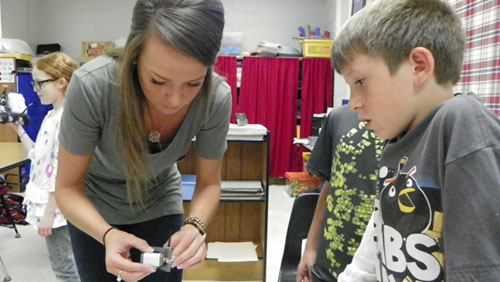
FAYETTEVILLE -- The department of curriculum and instruction in the College of Education and Health Professions at the University of Arkansas is making great strides in preparing future generations of educators, creators and innovators with its new certificate program in STEM education.
STEM is an acronym for science, technology, engineering and mathematics and represents an integrated approach to teaching the four disciplines. Educators and administrators across the country have pushed for broader incorporation of STEM education, particularly in elementary grades. The Arkansas Department of Education has been proactive in advocating for STEM education, said Cathy Wissehr, assistant professor of childhood education.
Beginning this year, students in the elementary and childhood education programs have the option of pursuing the STEM certificate in addition to their initial teaching license. The certificate involves four project-based courses and indicates expertise in STEM education.
"Prior to this year," Wissehr said, "there was no option for certification. We designed this program to meet the need for STEM-qualified teachers at the elementary level."
Michael Daugherty, department head of curriculum and instruction, said studies have repeatedly shown that students decide their aptitudes for math and science in elementary school.
"By the time students reach the fourth grade, about 30 percent of boys and girls have lost interest in STEM," Daugherty said. "By eighth grade, another 20 percent have decided that STEM is not connected to their education or future."
The goal of the STEM certificate is to reduce this trend and keep young students interested with project-based learning.
"It's all hands-on," Wissehr said. "With STEM, you're giving the kids something interesting and fun to work with and making it real to their lives."
Imperative to this is preparing a generation of teachers who are comfortable incorporating STEM into their classrooms.
"The STEM certificate program is designed to build the confidence of elementary teachers, prepare them to develop engaging STEM curriculum materials and provide them with the skills to deliver authentic STEM content that will capture and maintain the attention of young students," Daugherty said.
Senior Sarah Bart is majoring in childhood education and has enjoyed the opportunity to pursue this new certificate.
"My favorite classes have been the STEM classes I've taken," Bart said. "I love that when I go in to class I know my ideas will be appreciated and the sky's the limit on what we want to do for our projects."
One of the benefits Bart sees in STEM education is its practical applications.
"Incorporating the elements of STEM into one lesson allows students to work with real-world problems and find solutions, either on their own or by collaborating with others," Bart said. "These 21st-century skills will help young students in the future and hopefully encourage them to pursue careers in the STEM fields."
Last year, students and faculty in curriculum and instruction worked with Leverett Elementary School in Fayetteville to create a weekly robotics club. Bart led the first group with senior Bayleigh Jones. This year, Madelyn Bird, a junior pre-childhood education major, and Madison Steffen, a junior childhood education major, are serving as teachers of their own club.
"I was amazed when the principal told us there was a waiting list to get in the club," Bird said. "Madi and I have our own class of 20 students."
"When I was in elementary school, we had nothing like this," Steffen said. "It was very encouraging to me to see the students actually working on STEM-related projects and enjoying themselves. They were working on building the robots and seemed so genuinely excited about getting to work. It proved even further to me that implementing the STEM curriculum in classrooms of young students is crucial."
Faculty accompanied 29 STEM students to the International STEM Education Association annual conference in Branson, Mo., on Oct. 8-9. While there, several students competed against six universities in the Southwest Regional Technology and Engineering Collegiate Association competition, taking top prizes in several categories. Many of the senior STEM students also presented workshop sessions at the conference.
For more information on the STEM certificate, contact Kaylin McLoud at 575-4201 or kmcloud@uark.edu.
Contacts
Heidi Wells, director of communications
College of Education and Health Professions
479-575-3138,